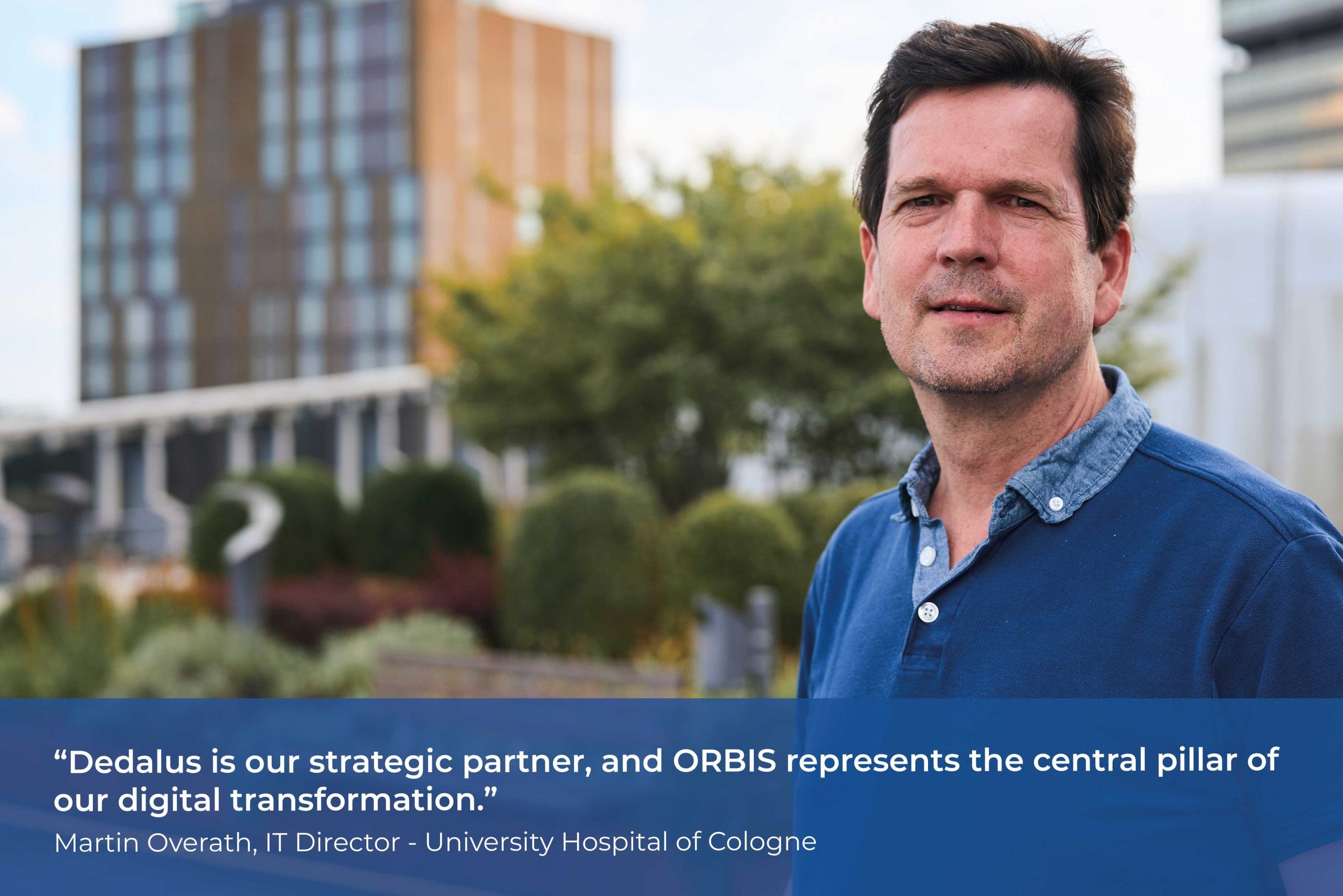From Complexity to Cohesion: Transforming Core Processes with ORBIS Integration
[CASE STUDY]: How University Hospital Cologne is Future-Proofing Patient Management with ORBIS

Strategic Digital Transformation in a Leading Academic Medical Center
The University Hospital Cologne, one of Germany’s foremost academic medical institutions, is navigating a significant transition as they respond to the discontinuation of SAP’s IS-H solution by expanding the clinical EPR Orbis across all functions with a comprehensive ORBIS integration strategy. With 1,573 beds across 60 clinics and institutes serving nearly 490,000 outpatient and 62,000 inpatient visits annually, this maximum care facility exemplifies how healthcare leaders can transform operational challenges into opportunities for system-wide enhancement.
Navigating Complexity in Healthcare IT
The hospital’s IT landscape encompasses over 500 systems managed by their internal IT department (uk-it), including three hospital information systems. “We are experiencing unprecedented demand for IT projects concurrent with the Hospital Future Act initiatives,” notes Martin Overath, IT Director. “This comes during a time of skilled personnel shortages, making strategic partnerships essential to our success.”
The PRO-ORBIS project was established to address the critical need to transition core functionalities—particularly inpatient and outpatient billing—from IS-H to ORBIS by the end of 2027. This initiative builds upon the hospital’s existing ORBIS implementation, which since 2003 has managed fundamental medical documentation, order entry, surgical planning, clinical documentation, performance recording, and telematics connections. “I see Dedalus HealthCare as a strategic partner and ORBIS as the central pillar of our digital transformation: We can only manage it together. The company has already developed its know-how in the case of similar HIS conversions in other university hospitals under”, says the IT director.
Comprehensive Approach to Digital Integration
“Within the PRO-ORBIS framework, we’re enhancing documentation quality from initial recording through to settlement, ultimately elevating operational excellence across the University Hospital of Cologne,” explains Overath. The expanded system is scheduled to go live on January 1, 2026.
The project has been strategically divided into 30 sub-projects to manage its complexity. The implementation involves completely redesigning the organizational model, rebuilding rights and role concepts, establishing separate tenants for medical care centers to ensure data protection compliance, and addressing all subsystem interfaces.
“Dedalus is our strategic partner, and ORBIS represents the central pillar of our digital transformation,” Overath affirms. “Their experience with similar transitions at other university hospitals provides invaluable expertise for our journey.”
End-to-End Process Excellence
The PRO-ORBIS initiative addresses several critical business challenges:
- Elimination of the complex IS-H interface, reducing coordination requirements and testing demands
- Resolution of revenue risks associated with delayed chief physician treatment notifications
- Reduction of the extended timeframe between inpatient discharge and billing
- Enhanced capability to respond to regulatory changes such as outpatient care requirements
- Standardization of admission processes across more than 25 different forms and numerous process variants
“With accurate implementation, all essential measures will be recorded automatically and forwarded with internal services for billing,” explains Overath. “For inpatient billing, I anticipate significantly improved process reliability, with further enhancements ensuring timely production of critical documents such as surgical reports and medical letters.”
Collaborative Implementation for Lasting Success
Success depends on comprehensive stakeholder engagement and training. The hospital is strengthening its key user structure, including the addition of two experienced physicians from surgery and internal medicine to support the implementation.
“The transition must be accompanied by careful preparation and end-to-end process mapping,” Overath emphasizes. “Our goal is to achieve a higher level of structured documentation and data that will not only improve treatment quality and simplify billing but also provide valuable resources for research and teaching.”
Beyond the immediate project goals, the IT Director envisions future applications of AI and enhanced resource management: “What we’ve already accomplished in parts of our operating rooms, we need to extend to all outpatient clinics, wards, and functional areas—the wise use of limited resources to achieve better processes, higher treatment quality, improved revenue protection, and ultimately, greater satisfaction among employees and patients.”
The University Hospital Cologne’s strategic partnership with Dedalus HealthCare demonstrates how forward-thinking healthcare organizations can leverage technology transitions to create more integrated, efficient, and patient-centered operations.
Find out more about ORBIS U